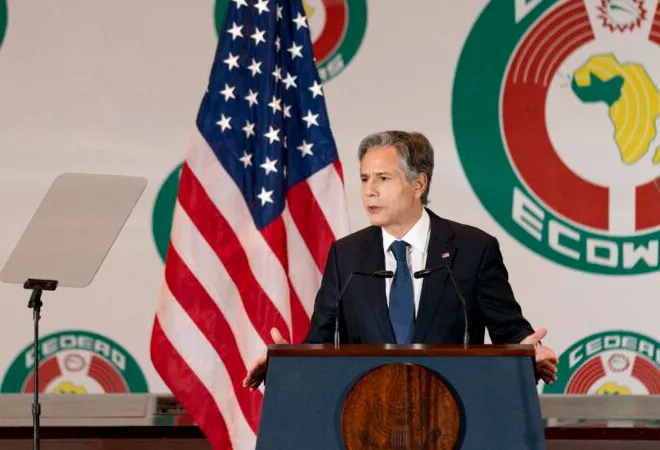
Last week, United States Secretary of State, Antony Blinken, during his three nation—Kenya, Nigeria, and Senegal—sojourn to sub-Saharan Africa unveiled a new United States (US) policy towards the continent. If
Blinken’s speech in Nigeria is anything to go by, there’s now a noticeable and discernible shift from the previous Trump administration in how the US views and frames its engagement with Africa. Blinken made a conscious effort to downplay China in Washington’s new policy approach. He insisted on facilitating Africa’s choices and partnerships that are mutually beneficial, rather than engaging in a zero-sum policy of competing with China in Africa.
Under the new policy, the US is expected to tailor its engagement around five key areas: Dealing with the COVID-19 pandemic, enhancing trade, promoting and revitalising democracy, combatting climate change, and ensuring peace and stability with a focus on equal partnerships. This could not have come at a more appropriate time, since trade between China and Africa increased by
40.5 percent in the first seven months of 2021, valued at US $139.1 billion. In 2020,
Chinese Foreign Direct Investment (FDI) in Africa reached US $4.2 billion, despite apprehensions over a possible reduction in ‘big-ticket’ investments due to the uncertainties of the COVID-19 pandemic. China has consistently proven that it is the most consequential player in Africa. Now that the US is also determined to revamp and rebuild its engagement with the continent, it is amply clear that Africa cannot be ignored.
Under the new policy, the US is expected to tailor its engagement around five key areas: Dealing with the COVID-19 pandemic, enhancing trade, promoting and revitalising democracy, combatting climate change, and ensuring peace and stability with a focus on equal partnerships.
Blinken’s reassurance to African leaders and stakeholders across the continent to “stop treating Africa as a subject of geopolitics and start treating it as the major geopolitical player it has become” is certainly a positive and welcome development. However, the US’ performance in Africa would be judged only by merit and its ability to produce genuine, tangible results. Merely making strong proclamations and toning down the China rhetoric would not suffice. Instead, it is in Washington’s interest to do away with its siloed approach and treat the continent as a single region by dismantling the artificial divide between North and sub-Saharan Africa.
Blinken began his visit in Nairobi, Kenya, in which talks ranged from the COVID-19 pandemic, climate change, to regional security issues, especially relating to mediation in countries like Ethiopia, Somalia, and Sudan. In his next stop in Nigeria, he
signed a US $2.17 billion development assistance agreement for a period of five years. Blinken also reiterated President Biden’s desire to host the
US–Africa Leaders Summit, although no date was mentioned. In Senegal, the US’ Development Finance Corporation provided an initial grant of US
$3.3 million to Institute Pasteur of Dakar and also announced a new US
$14.8 million programme with United States Agency for International Development (USAID) to help young women and entrepreneurs get access to business development and financing.
A fresh start is possible
It is no secret that the African region is undergoing significant changes—the continent is now becoming more youthful, populous, mobile-networked, and educated. By 2050, one in four people on Earth is expected to be African. Growing access to mobiles phones and affordable internet will make the continent increasingly connected to the world. Trade in goods and services under the
African Continental Free Trade Area (AfCFTA) agreement, that was launched on 1
st January, 2021, will help to reduce trade costs and enable Africa to integrate into global supply chains.
The African continent also holds three non-permanent seats in the UN Security Council, and represents the largest bloc in the UN General Assembly. Even though the continent contributes the least to climate change, it remains the most vulnerable to suffer the socio-economic effects of rising temperatures. It goes without saying that if a durable public health infrastructure is in place in Africa, it will go a long way in slowing the spread of infectious diseases and epidemics, such as Ebola and COVID-19. In many ways, Africans are integral to addressing some of the world’s common challenges.
Trade in goods and services under the African Continental Free Trade Area (AfCFTA) agreement, that was launched on 1st January, 2021, will help to reduce trade costs and enable Africa to integrate into global supply chains.
Combatting COVID-19 pandemic
Till date, the US has provided over 50 million COVID doses to 43 African countries and US $1.9 billion worth of assistance for emergency food and humanitarian support. Kenya, recently became the first African country to join the
Global COVID Corps—a new public-private partnership that would connect American businesses to help overcome last mile challenges, including delivery and logistical hurdles, and identify and address the gaps that are hindering vaccination efforts. However, given the fact that only a meagre
6 percent of Africans are fully inoculated till now, a better route would have been for the US to waive intellectual property rights by manufacturers to enable developing African countries to mass-produce vaccine doses. This effort has been spearheaded by South Africa and India.
Enhancing trade and investments
US trade with Africa accounts for less than 2 percent of its overall external trade. Initiatives like Prosper Africa (2019) and Africa Growth and Opportunity Act (AGOA) has failed to get the desired result of increasing two-way trade and investment. The benefits from the AGOA—which grants African countries’ preferential access to US markets—have accrued unevenly. The US can do a lot more to improve trade facilitation in the continent. Logistical hurdles and the lack of proper roads and highways restrict the flow of goods and people in key corridors. Therefore, the US along with the AfCFTA, the African Union, and African countries can pursue the development of strategic corridors to expedite the process.
The US can do a lot more to improve trade facilitation in the continent. Logistical hurdles and the lack of proper roads and highways restrict the flow of goods and people in key corridors.
In terms of investments, the US, through its
Build Back Better World (B3W) initiative, is attempting to close the infrastructure gap in Africa by providing an alternative to China’s BRI. The US approach is supposed to be sustainable, transparent, and values-driven. As part of the B3W initiative, the US has already conducted listening sessions in countries like Ghana and Senegal.
Promoting democracy
Advancing democracy and governance has remained a long-standing US goal in Africa. During Blinken’s visit, the issue of “democratic backsliding” was a major point of discussion. In the last two years, Africa has been experiencing a rising spate of successful or attempted coups in countries like Zimbabwe, Guinea, Mali, and, most recently in Sudan. Leaders are overturning constitutionally-mandated presidential term limits, rigging elections, misusing surveillance technology, and spreading disinformation. Blinken even spoke about the US’ own vulnerability to the challenges of democracy. Despite a draft towards authoritarianism, Africans continue to remain committed to democratic principles. The latest round of
Afrobarometer survey reveals that the US (33 percent) is the favoured choice for Africans in terms of development model, followed by China (22 percent) in second. This shows that Africans’ positive attitude towards China’s role in the continent does not affect Africans demand for democracy, although
rising instances of corruption is posing serious challenges.
Framing a constructive US—China competition in Africa
Major power competition for influence in the African continent is an undeniable geopolitical reality. However, this jostling for influence is not limited to the US, China and Russia. Other developing powers like India, Turkey, UAE, and Brazil, are making significant diplomatic and commercial inroads in the continent. This in part has been made possible by African countries’
exercising their agency and diversifying their external relations and choices of partners. Rather than being perpetual ‘rule-takers’, African countries and leaders are bluntly asserting their demands from bilateral partners.
Leaders are overturning constitutionally-mandated presidential term limits, rigging elections, misusing surveillance technology, and spreading disinformation.
Blinken’s visit did serve to assure the US’ desire to create partnerships that are mutually beneficial, rather than forcing African leaders to choose sides. It is in US’ interest to facilitate a competitive landscape of infrastructure financing, or what Blinken termed as a “race to the top” for global infrastructure. In doing so, the US would succeed in promoting a healthy competition with China and other powers engaged in the continent. Stressing on its own economic strengths and the durability of its private sector would go a long way in spurring a creative US engagement in Africa.
The views expressed above belong to the author(s). ORF research and analyses now available on Telegram! Click here to access our curated content — blogs, longforms and interviews.



 Last week, United States Secretary of State, Antony Blinken, during his three nation—Kenya, Nigeria, and Senegal—sojourn to sub-Saharan Africa unveiled a new United States (US) policy towards the continent. If
Last week, United States Secretary of State, Antony Blinken, during his three nation—Kenya, Nigeria, and Senegal—sojourn to sub-Saharan Africa unveiled a new United States (US) policy towards the continent. If  PREV
PREV


